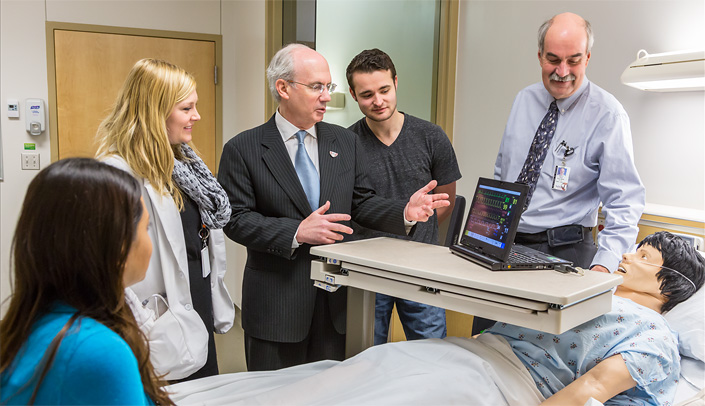Jeffrey P. Gold, M.D., began work Feb. 1 as UNMC’s chancellor. Below, he talks about his vision for UNMC.
Q: What excites you about being UNMC’s chancellor?
A: I’m excited for the opportunity to advance the greatness and distinction of UNMC, the related clinical enterprise and the health care delivery system in Nebraska. All of the foundational elements for a highly regarded and successful academic health science center are present in very high quality in Nebraska.
I look forward to working hard to further integrate our clinical care, research and education missions, so that we can serve the people of our state. Nebraskans expect and deserve the best. It’s my goal to build upon this institution’s legacy, elevating UNMC even higher as a very top-tier academic medical center.
Q: What are some of the critical challenges facing academic health science centers?
A: Challenges abound throughout the enterprise, but I know that these challenges also bring opportunities. Federal research funding is flat or declining, and competition for these dollars is fierce. There are opportunities for funding from private sources, but we need to ensure that our industry-funded research is done ethically and in a transparent manner. In education, student learning is shifting rapidly from traditional classrooms to high technology delivery mechanisms, such as clinical simulation and virtual reality, among others. We need to be a leader in these areas not only to provide our students with the environment that they expect, but more importantly to provide the best education possible to improve care delivery.
On the clinical side, the forces that led to creation of the Affordable Care Act (ACA) perhaps offer our greatest challenges and opportunities. Access to health care must be reshaped, our payer system must be improved, and health professional workforce shortages are curbing our efforts to provide health care to those who desperately need it.
In addition, all reputable indices indicate that Americans don’t get what they pay for in health care – our costs are by far the highest in the world, but our life expectancy nationally is about 10 years lower than the world’s best. That’s unacceptable, and UNMC must be a thought leader in offering solutions to these challenges, serving our state and as a model globally.
Q: What role do students play in the vibrancy of UNMC?
A: I really prefer the term “learners,” because that term encompasses residents, fellows and all those seeking continuing education. We all should be learners at every phase of our professional life, and I hope that we have a campus full of learners.
This zest for learning creates a passion for knowledge and discovery that every great academic health science center has. Per traditional students, I view my role to not only be accessible as a mentor professionally, but also to ensure that our medical center is an absolutely state-of-the-art learning environment.
To do so, we must embrace the best pedagogy and the latest, best technological tools. I fully anticipate that we will accelerate our efforts on this front. In addition, the learning environment is a key determinant of educational and clinical outcomes for our learners and our patients. This focus is critical for our future.
Q: How important are alumni and community leaders to the success of UNMC?
A: All alumni of UNMC have given to the institution their time, talent and investment, and they need to be respected for their contributions – both past and present – to the medical center.
Part of my responsibility is to ensure that the university is delivering a return on that investment by advancing its reputation, as the UNMC diploma’s value ebbs and flows as the university’s reputation fluctuates.
We will engage our alumni through numerous channels, and I will urge them to be key ambassadors for our university throughout their communities and their professional organizations. Certainly, UNMC has had tremendous success in receiving the support of community and philanthropic leaders. We will build on these private-public partnerships and will continue to be an academic medical center in which people want to invest.
There’s no question that alumni and community support will be essential to accomplishing many of our goals. We will steward their loyalty with great care.
Q: As chancellor, you also will serve in the new role of chairman of the board of the clinical enterprise. Why is this an important assignment?
A: It’s a great honor to join the team at a time that such important governance changes are being completed. The newly formed clinical enterprise organization will streamline patient experiences and reduce duplication of administrative services.
The new governance model will provide a mechanism of oversight that will ensure that all of our missions – clinical care, research and education – are working as mutually beneficial and highly integrated units.
It is imperative that all of our faculty and staff – whether they’re focused on research, education, clinical care or support services – collaborate and cooperate toward the common goals of the overall medical center.
This will enable us not only to survive, but to thrive in our current health care environment and into the future. The established time frame to complete these governance changes is critical to deriving optimal success.
